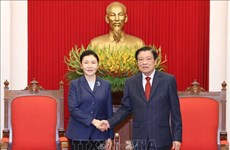PM pushes for state budget collection target
Prime Minister Nguyen Tan Dung has asked the financial sector to
spare no effort to meet the target on State budget revenues for this
year.
PM Dung made the request at the Ministry of Finance’s conference in Hanoi on July 17 to review the implementation of financial-budgetary tasks in the January-June period and the work in the remaining months of this year.
PM Dung made the request at the Ministry of Finance’s conference in Hanoi on July 17 to review the implementation of financial-budgetary tasks in the January-June period and the work in the remaining months of this year.
Prime Minister Nguyen Tan Dung has asked the financial sector to
spare no effort to meet the target on State budget revenues for this
year.
PM Dung made the request at the Ministry of Finance’s conference in Hanoi on July 17 to review the implementation of financial-budgetary tasks in the January-June period and the work in the remaining months of this year.
He stressed that the ministry should closely watch the refund of added-value tax, take action against the transfer of prices, deal with tax evasion and debt while heeding administrative reforms, especially in taxation and customs.
The leader also urged ministries, departments and localities to seriously monitor how the State money is spent to minimise wastefulness, especially costs in business travelling abroad, seminars, and equipment procurement.
The ministry reported that it collected over 356.5 trillion VND (16.9 billion USD) for the State budget in the first half of this year, or 43.7 percent of the estimates, a low level compared to the same period of several recent years.
Considering the current progress of budget collection, participants said it is very likely that budget revenues will decrease this year, while spending demand is increasing for economic revival and surmounting the aftermath of natural disasters and infectious diseases.
Deputy Chairman of the Hanoi municipal People’s Committee Nguyen Huy Tuong said the city may collect only 117.8 billion VND (5.6 billion USD) this year, equivalent to 73 percent of estimates.
He said the domestic economic turndown has forced numerous businesses to shut down, thus taking a toll on budget collection. Added to this, the State’s tax break policy also resulted in a reduction of more than 9.9 trillion VND (428 million USD) in budget contributions.
In order to fulfill the financial and budgetary tasks this year, the finance ministry pledged to continue with a strict and thrifty budgetary policy. At the same time, it will also keep a close watch over markets and prices, implement measures to stimulate production and trading, facilitate exports and control imports to drive trade deficit to the lowest level.
The ministry will step up the equitisation of State-owned enterprises and overhaul the financial mechanism in public sectors, strengthen the monitoring of financial market and institutions, and clamp down on corruption, wastefulness and negative occurrences.
It also suggested the Government handle the budget in the principle of sharing difficulties between the central and local governments, while localities should work harder to collect debts to offset tax breaks and exemption.-VNA
PM Dung made the request at the Ministry of Finance’s conference in Hanoi on July 17 to review the implementation of financial-budgetary tasks in the January-June period and the work in the remaining months of this year.
He stressed that the ministry should closely watch the refund of added-value tax, take action against the transfer of prices, deal with tax evasion and debt while heeding administrative reforms, especially in taxation and customs.
The leader also urged ministries, departments and localities to seriously monitor how the State money is spent to minimise wastefulness, especially costs in business travelling abroad, seminars, and equipment procurement.
The ministry reported that it collected over 356.5 trillion VND (16.9 billion USD) for the State budget in the first half of this year, or 43.7 percent of the estimates, a low level compared to the same period of several recent years.
Considering the current progress of budget collection, participants said it is very likely that budget revenues will decrease this year, while spending demand is increasing for economic revival and surmounting the aftermath of natural disasters and infectious diseases.
Deputy Chairman of the Hanoi municipal People’s Committee Nguyen Huy Tuong said the city may collect only 117.8 billion VND (5.6 billion USD) this year, equivalent to 73 percent of estimates.
He said the domestic economic turndown has forced numerous businesses to shut down, thus taking a toll on budget collection. Added to this, the State’s tax break policy also resulted in a reduction of more than 9.9 trillion VND (428 million USD) in budget contributions.
In order to fulfill the financial and budgetary tasks this year, the finance ministry pledged to continue with a strict and thrifty budgetary policy. At the same time, it will also keep a close watch over markets and prices, implement measures to stimulate production and trading, facilitate exports and control imports to drive trade deficit to the lowest level.
The ministry will step up the equitisation of State-owned enterprises and overhaul the financial mechanism in public sectors, strengthen the monitoring of financial market and institutions, and clamp down on corruption, wastefulness and negative occurrences.
It also suggested the Government handle the budget in the principle of sharing difficulties between the central and local governments, while localities should work harder to collect debts to offset tax breaks and exemption.-VNA













